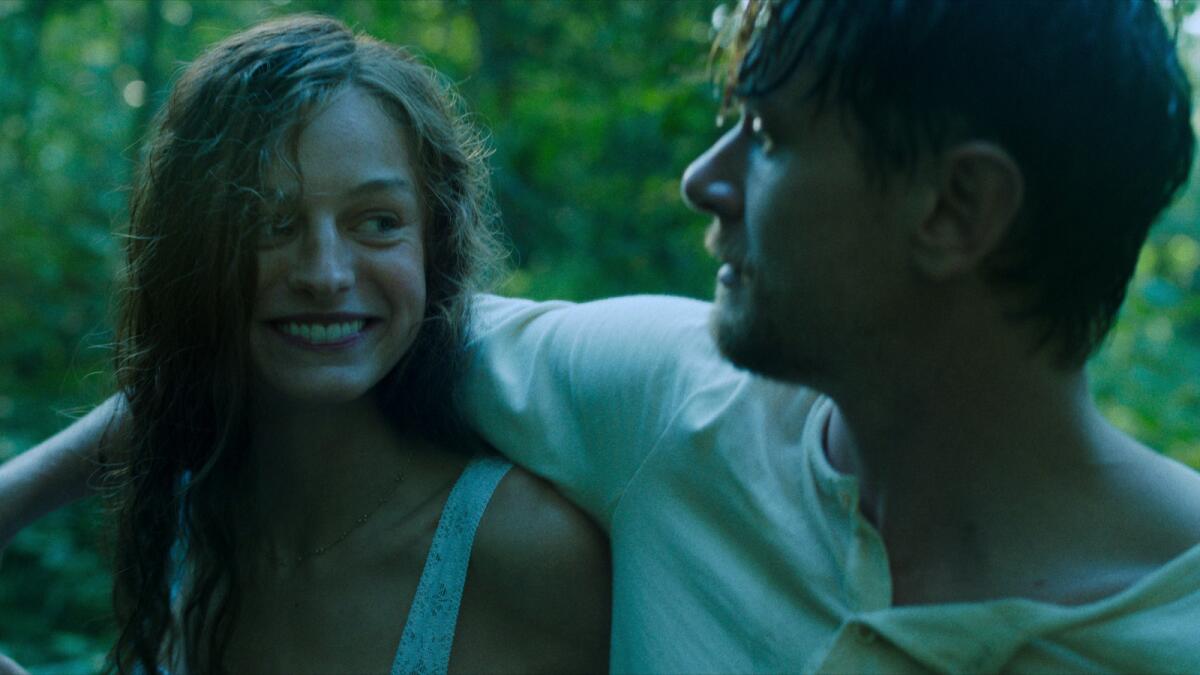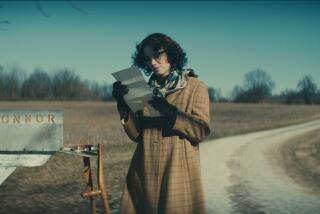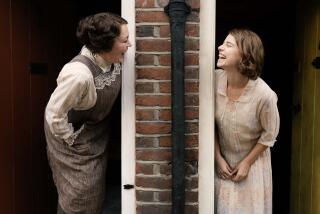Despite so-so sex, ‘Lady Chatterley’s Lover’ features a vibrant Emma Corrin

- Share via
Period movies often say as much about the time they were made as they do the era in which they take place. Adaptations of D.H. Lawrence’s scandalous 1928 novel “Lady Chatterley’s Lover” are no exception. How the book’s famously bold sexuality is rendered is going to look different in, say, a 1950s French romance, a soft-porn ’80s take from the “Emmanuelle” creative team, or a television miniseries, just a few of the many “Chatterley’s” that have risen in popular culture.
How, then, does the newest movie version fare — starring English lights Emma Corrin (the first Diana on “The Crown”) and Jack O’Connell as Lawrence’s class-crossing trysters in the throes of once-in-a-lifetime ardor — in the age of body positivity, male-gaze fatigue and the boink-athons of “Bridgerton” and “Outlander”? As brought to life by French filmmaker Laure De Clermont-Tonnerre, whose second film this is after her wonderful debut “The Mustang,” I’d say the passion-meter this time around is no different than expected from a coolly adult indie, but its dramatic, artistic heft overall never really rises above that of a solid “Masterpiece Theater” telling.
For your safety
The Times is committed to reviewing theatrical film releases during the COVID-19 pandemic. Because moviegoing carries risks during this time, we remind readers to follow health and safety guidelines as outlined by the CDC and local health officials.
Where this “Lady Chatterley” does set itself apart is in adhering to its titular character’s viewpoint, as if it were a first-person romantic journey from wedding excitement to marital disillusionment on a stifling estate, then body-and-soul conversion in the surrounding woods with O’Connell’s virile, kind-eyed gamekeeper. And Corrin is up to the task. The requirements of intimacy acting aside, the actor (who uses they/them pronouns) brings coltish physicality and expressive flush to all their scenes — whether lonely or laughing, aggravated or emboldened. It’s a true star performance, the light of intelligence practically beaming from this awakened woman’s eyes.
And those eyes do a lot of the best storytelling here. In the early scenes they twinkle with hope as everyone believes a happy marriage — and Chatterley heir — is assured between bubbly, sharp Constance (Corrin) and the Baronet Clifford (Matthew Duckett). When the Great War paralyzes Clifford’s legs, however, life at Wragby for Connie turns secretarial and nurse-like regarding her increasingly preoccupied husband, while her own need for human affection becomes a gnawing thirst.
When she meets working-class gamekeeper Oliver Mellors, those baby blues signal finding a kindred spirit in hurt, searching and sensitivity — all nicely reflected in O’Connell’s tough but warm Derbyshire accent. He too is a war veteran, but his wounds are a bad marriage’s, and like her, he reads. (Screenwriter David Magee puts Joyce on his hut shelf, a nod and a wink to D.H. Lawrence’s peer in the banned-book club.)
Connie’s and Oliver’s learned language together, however, is sensuality, whether practiced inside his hut with sunlight filtering through the slats, or outside among the trees and flowers. But these scenes are never as erotic as they should be; they feel rushed and restless, the camerawork and cutting hesitant to land on carnal joy, and marked by a lighting scheme and color palette in Benoit Delhomme’s cinematography too diffuse and monochromatic to suggest a torrent of blooming feelings. When Connie wears yellow or red clothing, it’s often more alive than the actors’ skin tones at ostensibly the height of ecstasy. Clermont-Tonnerre’s emphasis on playfulness and energy is understandable, but an opportunity to bring back a layered epicness to sex on film feels lost.
As the infidelity plot barrels toward its reckoning with class prejudice, and the moody, thumping cello returns to Isabella Summers’ strings-centered score, Corrin’s vibrant performance keeps us engaged. But so does Joely Richardson — a one-time Lady Chatterley herself (star of the aforementioned ‘90s serial) — this time around playing empathetic mine widow Mrs. Bolton, and Duckett’s portrait of uncaring ruling class prejudice carries the right mix of cluelessness and anger. The sex in this “Lady Chatterley’s Lover” may only be so-so this time around, but there’s no denying when Connie tells off her husband about his callous treatment of everyone; in this day and age of terrible bossmen, that counts as a climax.
'Lady Chatterley’s Lover'
Rated: R, for strong sexual content, graphic nudity and some language
Running time: 2 hours, 6 minutes
Playing: Starts Nov. 23, IPIC Theaters, Westwood; available Dec. 2 on Netflix
More to Read
Only good movies
Get the Indie Focus newsletter, Mark Olsen's weekly guide to the world of cinema.
You may occasionally receive promotional content from the Los Angeles Times.







